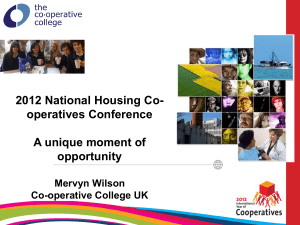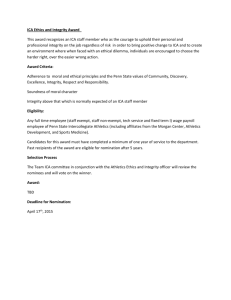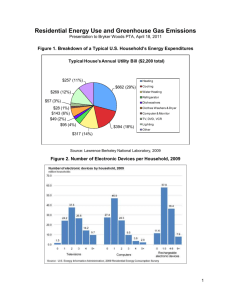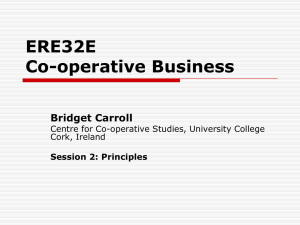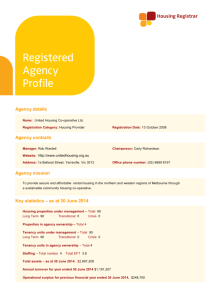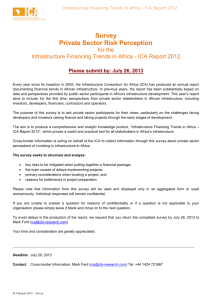Mr Seah Kian Peng, SNCF Chairman
advertisement
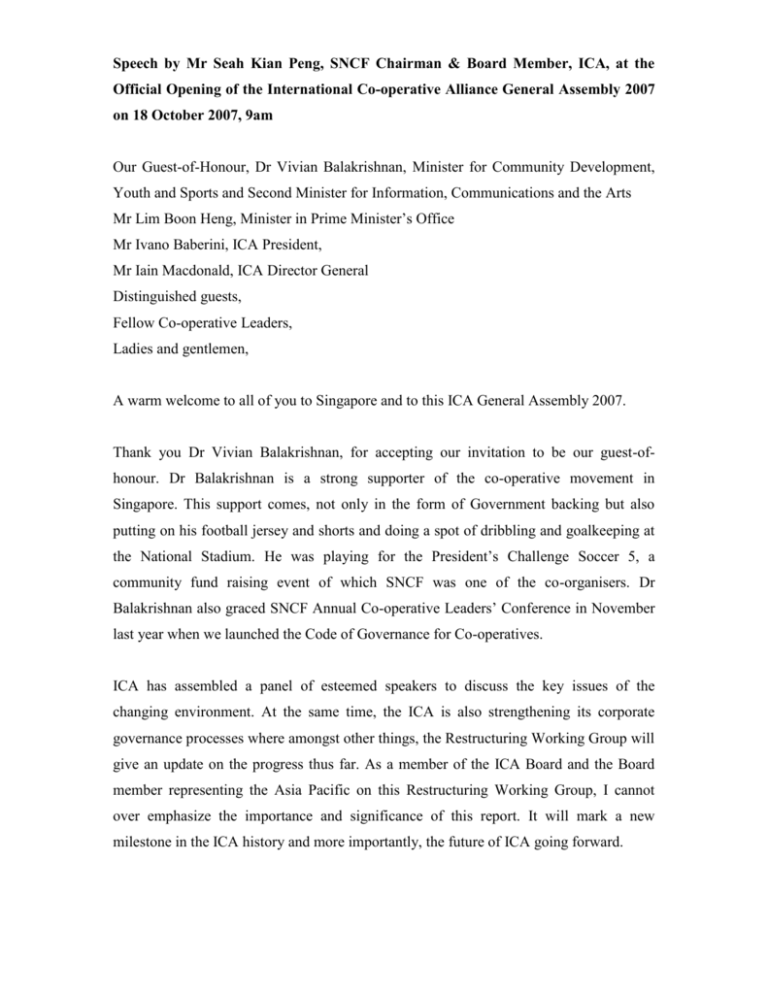
Speech by Mr Seah Kian Peng, SNCF Chairman & Board Member, ICA, at the Official Opening of the International Co-operative Alliance General Assembly 2007 on 18 October 2007, 9am Our Guest-of-Honour, Dr Vivian Balakrishnan, Minister for Community Development, Youth and Sports and Second Minister for Information, Communications and the Arts Mr Lim Boon Heng, Minister in Prime Minister’s Office Mr Ivano Baberini, ICA President, Mr Iain Macdonald, ICA Director General Distinguished guests, Fellow Co-operative Leaders, Ladies and gentlemen, A warm welcome to all of you to Singapore and to this ICA General Assembly 2007. Thank you Dr Vivian Balakrishnan, for accepting our invitation to be our guest-ofhonour. Dr Balakrishnan is a strong supporter of the co-operative movement in Singapore. This support comes, not only in the form of Government backing but also putting on his football jersey and shorts and doing a spot of dribbling and goalkeeping at the National Stadium. He was playing for the President’s Challenge Soccer 5, a community fund raising event of which SNCF was one of the co-organisers. Dr Balakrishnan also graced SNCF Annual Co-operative Leaders’ Conference in November last year when we launched the Code of Governance for Co-operatives. ICA has assembled a panel of esteemed speakers to discuss the key issues of the changing environment. At the same time, the ICA is also strengthening its corporate governance processes where amongst other things, the Restructuring Working Group will give an update on the progress thus far. As a member of the ICA Board and the Board member representing the Asia Pacific on this Restructuring Working Group, I cannot over emphasize the importance and significance of this report. It will mark a new milestone in the ICA history and more importantly, the future of ICA going forward. Beyond these issues, this General Assembly provide an excellent opportunity for not just Singapore co-operative leaders but all co-operative leaders throughout the world to explore and to learn from each other and thereby gain a much richer and broader perspective. Co-operatives are generally known more for reliability and incremental progress, rather than a snap of the fingers, lighting of a match magic. Yet, trustworthiness, sustainable growth and social missions have a place, a big place in this world. Indeed, cooperatives are the stuff of dreams too – a peaceful, evolutionary dream, into a common vision of a prosperous, united, caring and peaceful world. The hosting of the ICA General Assembly in Singapore demonstrates the close working relationship between and SNCF and ICA. The SNCF, as the national centre of the Singapore co-operative movement, was established in 1980. It has since grown from strength to strength. Today, SNCF has 73 affiliates with a total membership of over a million members. Affiliated to the ICA as a member organisation since 1985, we are committed to developing and maximizing the potential of co-operative leaders, and improving the quality of lives of our members and the community. Over the years, we have stepped up our involvement in the ICA activities. In year 2000, we witnessed a historical milestone in the co-operation between ICA and SNCF with the establishment of the ICA Asia Pacific Singapore Business Office. The setting up of this Business Office in Singapore has helped to enhance the co-operation among co-operatives from other countries as well as facilitate the promotion of inter-co-operative trade linkages. At the same time, its presence in Singapore resulted in a number of mutually beneficial developments for both ICA and SNCF. Since then, SNCF has jointly organised various major ICA events including the first Asia Pacific Co-operative Forum and the 4th Regional Assembly for the Asia-Pacific in 2000. We have received many distinguished co-operative leaders from all over the world. Some of our co-operatives have also established strong bilateral links with their counterparts in Asia and Europe. I myself sit on the ICA Board and several of my SNCF colleagues also assumed leadership positions in various ICA Sub-Committees at the regional levels, namely in areas of Human Resource Development, Consumer, Women, University and Youth. Co-operatives in Singapore command a presence that is unmistakable. We have cooperatives that have become household brands and that are regarded as models for cooperatives in other countries. To date, co-operatives formed by the NTUC Sector provide a wide range of services from childcare, housing, elderly care, food courts, supermarkets, insurance, pharmaceutical products, family clinics to thrift and loan services. Our cooperatives in the Credit, Campus and Service Sectors are also growing and impacting more and more lives. We are proud that 2 coops from Singapore – NTUC Income and NTUC Fairprice figure in the Global 300 coop rankings. These are the better known cooperatives. Yet some of our smaller partners are important and to me, just as if not more interesting. DEW – the cooperative for the development and empowerment of women through microloans is one example. It lends small amounts of money to women who otherwise would be considered bad credit risks. And in so doing, lift families out of poverty through the ingenuity, frugality and sheer will power of these women, many of whom are mothers. Cooperatives, because of the way we tap into self reliance on the part of the beneficiaries, and compassion, on the part of donors, wrap this into an overall package of a good bargain. So, as far as I am concerned, co-operatives will always have a special and enduring place in society. We want to continue to find ways to strengthen the mindshare of the co-operative movement as social enterprises playing a vital and valued social role. We need to be more than an arena, we want to be a player. On 11 November 2006, we launched our very own Code of Governance for Cooperatives. Good governance will create conditions necessary to facilitate and strengthen the good work of the co-operative movement. Through our Code of Governance, we can improve on our accountability and transparency. I call upon every co-operative, every participant, to squarely confront this responsibility, to establish sound parameters if we want to have best practices that will strengthen the global Co-operative Movement. In conclusion, I would like to emphasise that besides learning from one another ways to boost our business linkages through this event, I hope all 1,047 participants will have an enjoyable experience meeting and mixing with your counterparts from many different countries in the process. Indeed, some 69 countries are represented here. More importantly, we welcome your participation in the context of a multi-racial, multi-cultural and multi-religious society that is Singapore. SNCF would also like to take this opportunity to thank our main sponsor – Singapore Labour Foundation and all affiliated co-operatives, sponsors, supporters and partners for making this event possible. For a major conference like this to be successful, a lot of work goes behind the scene. Accordingly, I want to thank all my Exco colleagues and staff in SNCF for their hard work and the tremendous efforts that they have put in. Special thanks also go to the team in ICA HQ. It is a pleasure to work with all of you on this. Our invaluable appreciation also go to my colleagues on the ICA Board, led by President Mr Ivano Barberini. Thank you for giving us the honour and privilege to host this very important event. Finally, we welcome and thank all distinguished delegates for your spontaneous support. Your overwhelming participation is a clear indicator of the abiding interests of the cooperative leaders and Government officials in the development of co-operatives in the face of globalisation and increased competition. On that note, I wish everyone a fruitful and meaningful conference ahead. Thank You.

